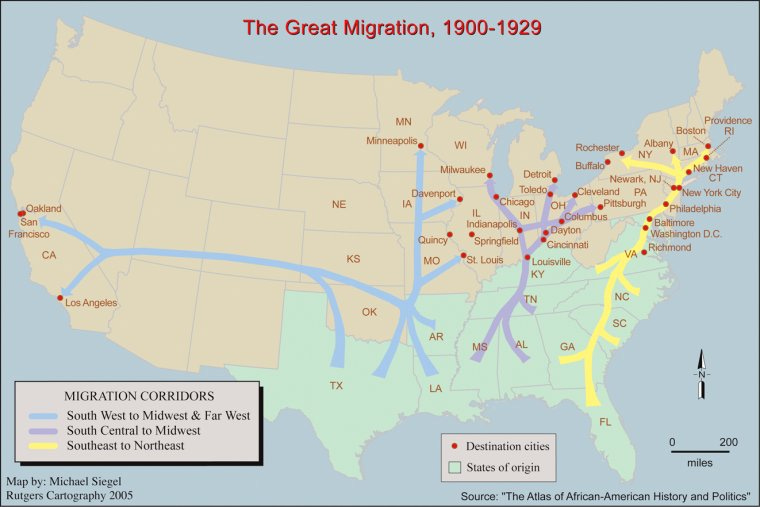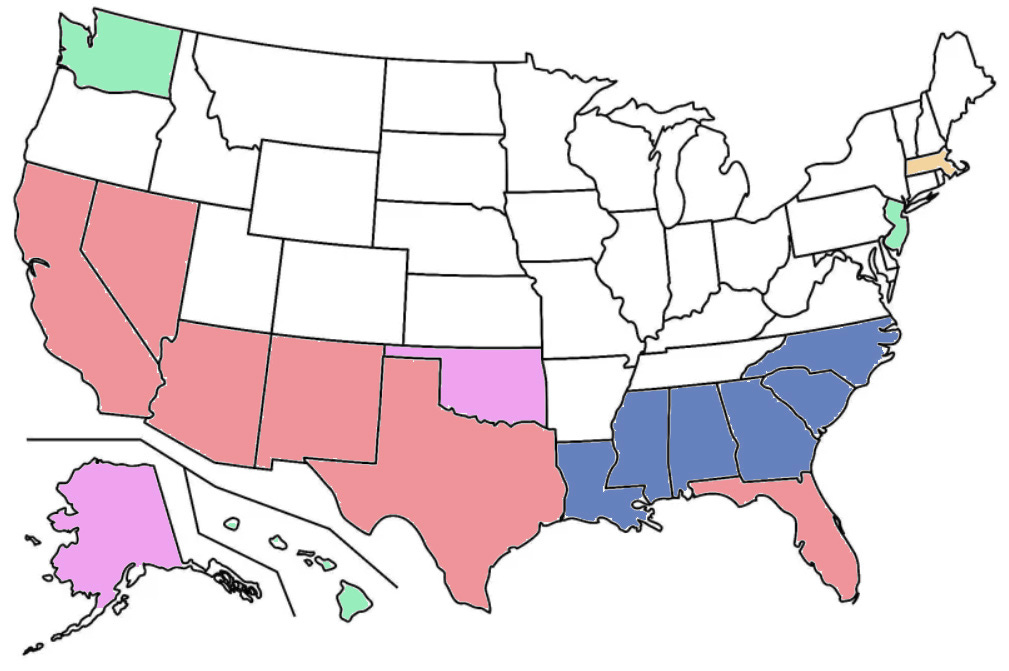Charles Blow Preaches Racial Separation
Segregation is back, baby!
In an August 18 New York Times audio essay, Blow asked his fellow black Americans to return to the South to “significantly increase their own political power.”
There is no way to truly have power in the country if you do not also have access to state power. And there is right now no state in the country where Black people are a majority, and not one where they are projected to be a majority. And that powerlessness is something that I detest.
Blow sees the Great Migration—the post-Civil War exodus that saw six million black Americans leave the South for better lives in Northern cities like Chicago, New York, and Detroit—as flawed because it led to
the rise of racialized, chronic ghettos in urban areas, intense concentrated poverty, militarized policing
A return to the South, he implies, will reverse these negative trends while at the same time giving black people more political power.
I have problems with Blow’s thesis, both practical and moral.
Blow offers Georgia as an example of black power success. The black share of the vote in Georgia increased, and “this allowed Black people to be the leading portion of the coalition that swung that state for a Democrat, Joe Biden.”1
On the surface, sure, but what happens if you look more closely at the 2020 election? Biden picked up Georgia by a hair, but he also won a number of northern states by tight margins. Biden took Wisconsin with only 20,682 extra votes, a 0.6% margin of victory. Black people are 6.4% of Wisconsin’s population. If one-tenth of Wisconsin’s black voters (who skew heavily Democrat) moved to Georgia, there goes Biden’s victory. Pennsylvania is even worse, Biden’s margin was bigger, 1.2%, but the state has a much larger black population. Ten percent gone South would be 150,000 people. Michigan has the same problem. Blow’s scheme guarantees Georgia but costs the Democrats three rust-belt states, 44 electoral votes, and the election. Hello President Trump!
More importantly, Blow’s plan is ugly race essentialism. It embraces the idea that black people are defined primarily by their skin color and should mainly associate with other black people. Focusing on creating black states will guarantee that black people will gain elective office. This all assumes that for you to have power, people who look like you must have power.2
This is ridiculous. Do I "truly have power" because I'm in a white majority state? Tell that to my 400-square-foot apartment and too-small savings! Or look at West Virginia, with its 93% white population. West Virginia’s 2021 median household income was 51,248, making it 49th in the country.3 Does white dominance mean that some ex-coal miner on disability living in a run-down trailer home in McDowell County has power?
Do white people as a group have more power than black people as a group? Of course, but we don’t live as racial groups; we live as individuals, families, and communities. I’m not arguing race doesn’t matter. Racism is real, and we can’t ignore it, but seeing everything through the lens of race distorts reality. When Obama was president, did black people suddenly thrive because their guy had power? Did elections give power to this black man in North Carolina?
I voted for Obama. Seems like when he left office nothing changed for me. Nothing changed for this neighborhood. So I say, ‘We had a black president and I still working for eight dollars per hour and nothing has changed. Nothing. Ain’t nothing changed. Every single president. Obama. Bush. Clinton. Same thing.
— From “The Non-Voter,” by Chris Arnade, American Compass (August 2020).
The people with power don't have it because they share the skin color of government officials; they have power because they have money and influence. Most folks, black and white, lack both those things and have little to no power.
Compare me to Charles Blow. By any measure, Blow has far more power than I do, never mind who won which election. Blow is a columnist at the New York Times and a political analyst on MSNBC. His memoir, "Fire Shut Up in My Bones," has been turned into an opera that was performed at the Metropolitan Opera, and take a gander at the view from his Atlanta condo!

In his book The Devil You Know: A Black Power Manifesto, Blow crows about his willingness to make the geographical sacrifice of moving to Atlanta:
I could easily have spent the rest of my life filling my calendar with Park Avenue parties, exclusive salons, and destination vacations. How could a Black man, having risen to the height of New York’s white cultural inclusion, spurn it?
My heart—which has never been to a Park Avenue party or an exclusive salon—bleeds in sympathy.
And what kind of world is Blow trying to create? If black people move to make black states, won’t that leave other states even whiter? Will Hispanic and Asian people do the same? Would every ethnic group eventually have its own racial homelands? Black people would own the deep South; Hispania would stretch from California to Florida; Native Americans would get Oklahoma and Alaska; while Asian Americans would have the scattered Kingdom of Washington, New Jersey, and Hawaii.4 Resegregation on a national scale!
Luckily, the world of racial division dreamed of by Blow will not come to pass. In fact, we’re moving in the opposite direction. Interracial marriage rates are up, and America's melting pot experiment continues to work its magic. Blow’s book and article are pie-in-the-sky dilettante activism. They sound radical but will achieve nothing, except perhaps to slightly slow the ending of our nonsensical focus on the fiction known as race.
But what do you think?
A white guy.
And black representatives make up 11% of Congress, similar to black people’s 12.6% share of America’s population.
West Virginians darkly joke, “Thank God for Mississippi.”
I gave my Jewish cousins Massachusetts. New York would have been nice, but too many white folks live upstate.






I firmly believe the best way to decrease racism is to promote natural integration. Connect over shared interests and beliefs, focus less on cosmetic differences.
The opera based on his book was a huge hit....I didn't get to see it.
I can't think of anything that would destroy Black people's power more than moving and filling up 2 or 3 states.
My sense is that Blow's fear is in fact the ascendancy of Hispanics, whose population could grow to dwarf that of Blacks. (Already almost 1 1/2 times as large.) But in his salons, that can not be admitted....so he reaches for White.